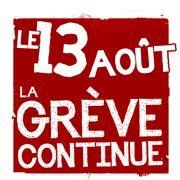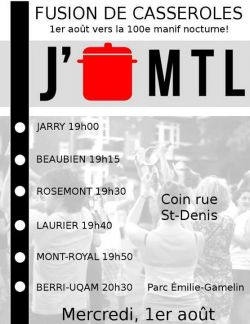Coop média de Montréal
Journalisme indépendant
A Movement Stronger than Elections
By the time you're reading this there's a strong chance that Quebec Premier Jean Charest has launched the province's 40th general election. And while we'll be hearing about politicians gearing up for election campaigns all day, today will also see another movement come back in force.
Over the last few months, many have asked if the movement against tuition fee increases in Quebec had run its course, lost its momentum. The summer months have been quieter, that's undeniable. But those who said that the movement was simply catching its breath for the next leg of the race were vindicated when some 80,000 people took part in a march on July 22. It was the fifth '22nd' march of its kind, following similar protests of hundreds of thousands of people since March 22nd.
It was certainly smaller than the other demonstrations, but it's a well-known secret that political organizing in Montreal is about as hard in the summer as eating a popsicle without it melting in your hands.
And that march was only the most visible aspect of a campaign that could very well come back as strong as ever - and possibly even stronger - in the coming weeks.
Tonight, for example, could see the resurgence of the casseroles and night marches. The nightly demonstrations have continued, and tonight will be the 100th consecutive march through downtown Montreal. But for the past several weeks they have been a shadow of their former selves: at times, barely 30 people have joined in for what at one point could draw 20 to 30,000 people to the streets. There are plans tonight, though, for a casserole marathon along St-Denis, starting in the northern borough of Villeray and stopping at several major intersections in five other neighbourhoods as they make their way, clanging pots and pans, to Place Emilie Gamelin, the traditional starting point of the night demos. From there, the marches will combine and once again head through the streets of downtown.
Much more is being planned for the coming weeks, though. On August 6, teachers are holding a demonstration at UQAM (https://www.facebook.com/events/393041237416870/), based on the Professors Against Tuition Hikes Manifesto (https://www.facebook.com/notes/guillaume-roberge-tanguay/professors-against-tuition-hikes-manifesto/400365730020430). On August 8, CLASSE is organizing a demonstration at 11:30am at Philips Square. On August 10, the neighbourhood assemblies that have quietly kept the flame alive - and if anything stoked the coals ever hotter for a broader movement - are organizing a day of action, and CLASSE will be holding a free show at the Olympia.
And on August 13, classes restart. After being locked out from their schools earlier this summer after the passage of Law 78, students who were then on strike are now being sent back to class by the Charest government. But the resumption of the semester also comes with the threat of heavy fines for anyone who attempts to enforce a strike mandate. The Charest government has not banned a student association's ability to vote to strike, but they have made it illegal to enforce it through picket lines or any action that could discourage classes from re-starting. It is a move to take the teeth out of any strike action, which clearly requires collective support. Individuals who take part in or support picket lines face up to $1,000 in fines, spokespeople for student groups up to $25,000, and student unions up to $125,000 a day, plus they could see their membership dues and offices confiscated. All this even if a majority of students have voted to remain on strike.
There are question marks as to what will happen. Most student associations have not had quorum over the summer, so they are organizing general assemblies the first week back in order to let their members express themselves. There is a chance that some of these assemblies could result in students returning to class. But the call to remain on strike has been growing the past few weeks.
CLASSE has vowed to continue mobilizing, and FEUQ and FECQ, while not explicitly saying the strike will continue, have committed to campaigning around tuition fees during the election. There are also mobilizations building outside of the student associations. The website http://bloquonslarentree.com (Block Back To School) was recently launched. It lists the start dates of all CEGEPs and universities affected by the forced return to class, and is also serving as a hub for a planned convergence of supporters of the strike coming to Montreal. The site will be offering information on lodging and strike actions, among other things. They are also promoting a second 'consulta' to “block the return to school”: http://www.bloquonslarentree.com/en/content/2nd-consulta-block-return-school.
The impact the election will have is also a question. Some are arguing that protests during elections could play into the Liberals' hands. Wars of words have taken place on opinion pages of newspapers and online about whether students should support one political party over another, and whether they should be actively hitting the pavement to help specific campaigns. One of the most high-profile student leaders, Leo Bureau-Blouin, ex-head of FECQ, is actually running for the Parti Quebecois in a riding in a Montreal suburb (he was not wearing his red square at the press conference announcing his candidacy).
There is also a strong current encouraging students to not engage in electoral politics; this goes beyond the fact that student unions are remaining non-partisan (although it is clear they want the Liberals gone). Instead, proponents are warning that electoral politics will serve to limit what has been a growing movement that has rejected a political system many see as corrupt and unrepresentative.
Instead students are being urged to continue the strike tactics they carried out under a sitting government, exerting pressure on both politicians and their supporters - mostly banks and crown corporations - as well as working to spread information about the necessity of the tuition fee freeze to ensure accessible, public education.
While it's clear that the political reality has changed - during an election there is no government to negotiate with, only candidates vying for office - sticking true to their message and tactics may be the best choice students and their supporters have. While there have been critiques of certain tactics, one of the strengths of the movement has been that is has stuck to its principles throughout the past months, not diverging from the plan of building a mass movement - based both on popular education, but also on direct democracy and actions ranging from large, family-friendly demonstrations to direct actions meant to turn up the heat - in order to counter the tuition fee increases.
And it is exactly this example that the student movement has shown that could make this an August (and most likely a September) to remember. Not because of the cynical politicking that we're certain to be subjected to (it's already beginning), but because the anti-establishment message of the student protests - we will organize ourselves, and keep organizing, until we achieve our goal - is spreading.
Neighbourhood assemblies, based on direct democracy and participation, while strongest in Montreal, are also taking place across the province. These assemblies are certainly being fueled by opposition to Bill 78 (they grew out of the casseroles demos, where neighbors who finally met each other for the first time on the street decided that it was time to start working together collectively at the neighbourhood level), but there is also a spark of anti-establishment there too, based on a wide range of complaints. This goes from government corruption (A provincial inquiry is currently blowing the lid wide open on illegal campaign contributions, which threatens to ensnare the Liberals, PQ and the newly formed CAQ; cutting the impact of the commission short is another reason people believe the Liberals decided to call an election now) to the give-away of natural resources and the clear path to environmental destruction that is the Plan Nord. So while polls, campaign speeches and political debates will still certainly grab headlines, there is a real chance that more people than ever will be looking straight through them, and instead keep campaigning on issues important to them, and forcing politicians to respond.
Will this lead to record low turnouts at polling stations? Record high numbers? A sea-shift that sees smaller parties like left-wing Québec Solidaire (or possibly right-wing CAQ) gain a higher proportion of seats? Could a cynicism towards politics mean that only the die-hards vote, sending the Liberals in for another term, or placing the PQ back into the seat of power?
Perhaps the more relevant question is: by the end of August, will that still matter? Or will the same movement that has rocked the political and social foundations of the province since last February continue to grow? Will it be able to force whichever party is elected (through a system more and more people reject) to act on the issues people are concerned with? Can it stop the politicians from just brandishing their platforms that are built to please the economic and political elite who ensure the same parties and politicians rotate in and out of office? We'll have some answers soon enough.
About the poster
The site for the Montreal local of The Media Co-op has been archived and will no longer be updated. Please visit the main Media Co-op website to learn more about the organization.





